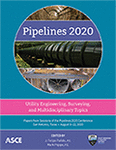Pipelines 2020
Applying Survival Analysis to Pipeline Data: Gaps and Challenges
Publication: Pipelines 2020
ABSTRACT
A major challenge in water pipe infrastructure asset management is to determine the deterioration process for water pipes. The deterioration processes are usually modeled with a decay curve, which describes how pipe performance changes with time. Decay curves can also be used to predict the future performance of a water pipe. The methodology used to develop decay curves should be interpretable, reproducible, and validated. Many studies have been conducted to apply survival analysis to pipeline data, but most of the existing studies ignore the left-truncation problems in pipe break history records. Instead, in the modelling process they assume the first recorded failure to be the real first failure. This assumption leads to incorrect inferences and systematic biases by ignoring missing truncated failure records (i.e., breaks and leaks). In this paper, we summarize the identified major gaps and challenges when applying survival analysis to pipeline data by examining the published literature, practices, and the water pipeline break history data we collected from utilities across the U.S.
Get full access to this article
View all available purchase options and get full access to this chapter.
REFERENCES
Carrión, A., Solano, H., Gamiz, M. L., and Debón, A. (2010). “Evaluation of the reliability of a water supply network from right-censored and left-truncated break data.” Water resources management, 24(12), 2917–2935.
Council, A. W. U. (2012). “Buried No Longer: Confronting America’s Water Infrastructure Challenge.” AWWA, Denver.
García-Mora, B., Debón, A., Santamaría, C., and Carrión, A. (2015). “Modelling the failure risk for water supply networks with interval-censored data.” Reliability Engineering & System Safety, 144, 311–318.
Kabir, G., Tesfamariam, S., Loeppky, J., and Sadiq, R. (2016). “Predicting water main failures: A Bayesian model updating approach.” Knowledge-Based Systems, 110, 144–156.
Kabir, G., Tesfamariam, S., and Sadiq, R. (2015). “Predicting water main failures using Bayesian model averaging and survival modelling approach.” Reliability Engineering & System Safety, 142, 498–514.
Le Gat, Y. (2014). “Extending the Yule process to model recurrent pipe failures in water supply networks.” Urban Water Journal, 11(8), 617–630.
Leighton, J., Evonuk, D., and Liberator, T. (2011). “Portland’s Water Distribution Pipes Asset Management Plan>” Pipelines 2011: A Sound Conduit for Sharing Solutions, 33–43.
Mailhot, A., Pelletier, G., Noël, J.-F., and Villeneuve, J.-P. (2000). “Modeling the evolution of the structural state of water pipe networks with brief recorded pipe break histories: Methodology and application.” Water Resources Research, 36(10), 3053–3062.
Pan, W., and Chappell, R. (1998). “A nonparametric estimator of survival functions for arbitrarily truncated and censored data.” Lifetime data analysis, 4(2), 187–202.
Scheidegger, A., Leitão, J. P., and Scholten, L. (2015). “Statistical failure models for water distribution pipes – A review from a unified perspective.” Water Research, 83, 237–247.
Scheidegger, A., Scholten, L., Maurer, M., and Reichert, P. (2013). “Extension of pipe failure models to consider the absence of data from replaced pipes.” Water research, 47(11), 3696–3705.
Snider, B., and McBean, E. A. (2020). “Improving Urban Water Security through Pipe-Break Prediction Models: Machine Learning or Survival Analysis.” Journal of Environmental Engineering, 146(3), 04019129.
Thomson, J., Flamberg, S., and Condit, W. (2013). “Primer on Condition Curves for Water Mains.”
Vakulenko-Lagun, B., Mandel, M., and Betensky, R. A. (2019). “Inverse probability weighting methods for Cox regression with right-truncated data.” Biometrics.
Vladeanu, G. J., and Koo, D. D. (2015). “A comparison study of water pipe failure prediction models using Weibull distribution and binary logistic regression.” Pipelines 2015, 1590–1601.
Xu, H., and Sinha, S. K. (2019). “A Framework for Statistical Analysis of Water Pipeline Field Performance Data>” Pipelines 2019: Multidisciplinary Topics, Utility Engineering, and Surveying, American Society of Civil Engineers Reston, VA, 180–189.
Xu, H., Sinha, S. K., and Vishwakarma, A. (2020). “Development of a Fuzzy Inference Performance Rating System for Water Pipelines Using a Comprehensive List of Input Variables>” Pipelines 2020, American Society of Civil Engineers Reston, VA.
Information & Authors
Information
Published In
Pipelines 2020
Pages: 148 - 158
Editors: J. Felipe Pulido, OBG, Part of Ramboll and Mark Poppe, Brown and Caldwell
ISBN (Online): 978-0-7844-8321-3
Copyright
© 2020 American Society of Civil Engineers.
History
Published online: Aug 6, 2020
Published in print: Aug 6, 2020
Authors
Metrics & Citations
Metrics
Citations
Download citation
If you have the appropriate software installed, you can download article citation data to the citation manager of your choice. Simply select your manager software from the list below and click Download.
